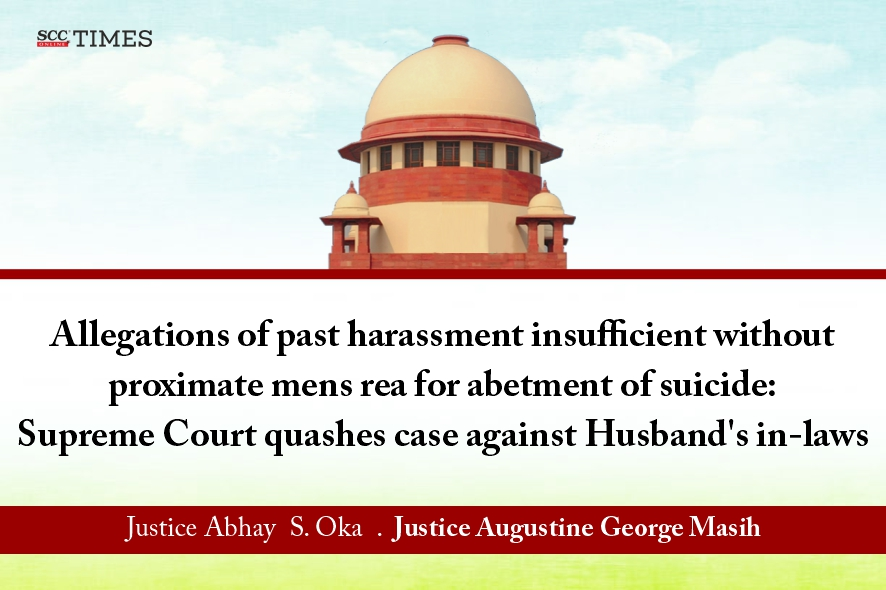Supreme Court: In two appeals preferred against the judgment passed by Madras High Court, wherein the Court dismissed the petitions preferred by the accused persons under Section 482 of the Criminal Procedure Code, 1973 (‘CrPC’) for quashing of the chargesheet submitted against them under Section 306 of the Penal Code, 1860 (‘IPC’), the division bench of Abhay S. Oka and Augustine George Masih*, JJ. highlighted that mere allegations of harassment, especially when made about an incident that occurred a month prior, followed by a complete lack of contact, could not suffice to conclude that the accused persons compelled the deceased to take his life.
The Court held that since the essential ingredients for the offence of abetment to suicide had not been fulfilled, the continuation of the proceedings was not sustainable. Accordingly, the appeals were allowed. The impugned judgment dated 13-04-2018 passed by the High Court was quashed and set aside, along with the proceedings pending before the Assistant Sessions Judge, Kanchipuram.
Background
The relevant facts of the case indicated that the deceased-husband and accused 7- wife were married on 15-09-2013. Both were well-qualified individuals, with the deceased being an engineer and accused 7 holding an MBA degree. Soon after their marriage, the relationship between them deteriorated. It was alleged that on 10-11-2013, accused 1 to 6 visited the residence of the deceased and engaged in a quarrel. They not only abused the deceased and his family using filthy language but also insulted him by calling him impotent and infertile. Accused 7 left with accused 1 to 6 to her parental home. The prosecution claimed that from 10-11-2013 to 09-12-2013, the deceased was continuously harassed by accused 1 to 7, which ultimately drove him to commit suicide. Initially, a case was registered by the deceased’s younger brother. It was further alleged that while taking accused 7 with them, the other accused had threatened to file a false dowry case against the deceased and his mother. Ashamed and depressed, the deceased reportedly withdrew from society and stopped leaving his house. During the investigation, the deceased’s mother handed over torn pages from a diary allegedly maintained by the deceased, which contained a suicide note outlining the harassment he had suffered at the hands of the accused. Considering this, the police altered the case to one under Section 306 IPC. Following the completion of the investigation, a chargesheet was filed, and the case was committed to the Court of Sessions. A petition under Section 482 CrPC was subsequently filed before the High Court, challenging the charges on the ground that the ingredients of Section 306 IPC were not satisfied, even assuming the suicide note to be genuine. Alleged flaws in the investigation were also raised. However, the High Court dismissed the petition, leading to the filing of the present appeals.
Analysis and Decision
The Court noted that the incident which allegedly triggered the suicide, according to the suicide note, occurred when the relatives of the deceased’s wife, who were arrayed as accused in the case, barged into their house on 10-11-2013. They started abusing the deceased and his mother using filthy language and were alleged to have manhandled them. Following this, the wife of the deceased went with them to her parental home, and while leaving, they publicly shouted that the deceased was impotent. Furthermore, his wife had threatened to publish his nude photographs, which she had taken, on the internet. The allegations further stated that the very next day, his wife along with two other individuals, came to their house for a discussion about the incident that had taken place on 10-11-2013. This was seen as a well-planned and executed act to damage the reputation of the family. Allegations of illicit relations involving his wife and the threat of false implication in a dowry case were also highlighted.
The Court said that what primarily emerged from the sequence of events, statements, and the suicide note was that from 11-11-2013 until the date of the suicide on 09-12-2013, there had been no contact whatsoever, either in person, by phone, or through any other means between the deceased or his relatives and his wife or any of the other accused. This absence of communication indicated that there was no continuous harassment, torture, or pressure exerted by the accused persons on the deceased during that period. As such, there was no proximity of any alleged harassment or instigation immediately preceding the suicide. Furthermore, the contents of the FIR did not, in themselves, reveal any active or direct act that could be said to have left the deceased with no option but to commit suicide. From the suicide note, no abetment could be established; there was no evidence to suggest that the accused had instigated the deceased or subjected him to persistent cruelty or harassment that would constitute abetment of suicide.
The Court highlighted that mere allegations of harassment, especially when made about an incident that occurred a month prior, followed by a complete lack of contact, could not suffice to conclude that the accused persons compelled the deceased to take his life.
The Court further emphasized that mens rea could not be presumed; it had to be clearly established. In the absence of a positive act on the part of the accused persons that could be said to have instigated or aided the commission of suicide, the essential ingredients of the offence were found to be lacking.
The Court explained that Section 306 IPC required, as a first condition, that a person had committed suicide. However, for establishing abetment of such an act, the essential ingredients needed to be found within Section 107 IPC. Under Section 107, abetment required either: instigation; engagement in a conspiracy with others to commit the act or omission; or intentional aiding of the act by any action or illegal omission. The Court noted that through a large number of its previous judgments, it had been firmly established that the essential elements of the offence under Section 306 IPC were: (i) abetment, and (ii) the intention of the accused to aid, instigate, or abet the deceased in committing suicide. The Court further observed that merely because an act of the accused was insulting or involved the use of abusive language, it would not by itself amount to abetment of suicide. There had to be clear evidence suggesting that the accused, by such acts, intended to provoke or instigate the deceased to take the extreme step of ending their life.
The Court stated that since the essential ingredients for the offence of abetment to suicide had not been fulfilled, the further continuation of the proceedings was not sustainable. The other evidence, such as witness statements relied upon by the prosecution apart from the suicide note, did not, in any manner, strengthen the prosecution’s case, especially considering that the foundation of the case rested on the suicide note itself. With the element of abetment conspicuously absent from the allegations made in the FIR, which was primarily based on the suicide note, the essential requirements for constituting an offence under Section 306 IPC remained unfulfilled. As a result, the continuation of the criminal proceedings initiated against the accused persons amounted to an abuse of the process of law. The Court emphasised that it could not permit such proceedings to degenerate into instruments of harassment or unjust prosecution.
The Court concluded that since the offence under Section 306 IPC was not made out, the continuation of proceedings against the accused persons could not be permitted. Accordingly, appeals were allowed. The impugned judgment dated 13-04-2018 passed by the High Court was quashed and set aside. The proceedings pending before the Assistant Sessions Judge, Kanchipuram, were also quashed and set aside.
CASE DETAILS
|
Citation: Appellants : Respondents : |
Advocates who appeared in this case For Appellants(s): For Respondent(s): |
CORAM :











